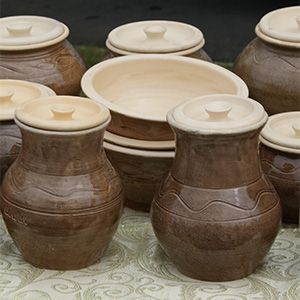Pottery

Pottery is considered to be one of the oldest crafts on earth. It was born in the Neolithic era, which is confirmed by numerous finds of archaeological excavations: hand-molded clay ware, primitive cooking utensils on fire, vessels for water and grain. Clay was spread everywhere and was the handy material that can be easily processed and from which everything can be molded. In the skilled hands of the master, the shapeless, plastic material, as if by magic, turned into dishes and ornaments. With the invention of the potter's wheel, and then with the discovery of the technology of roasting, pottery became the most common in everyday life.
In Russia there were many pottery workshops, the products of which differed in form, size, and technology of roasting. Pottery was considered the most honorable and important craft, which was constantly developed and improved. One of the centers of pottery production on Vladimir land was Korovino village of the Melenki district.
Korovino’s black-glossy tableware was well-known for its simplicity and functionality: food pots of various capacities, dairy crockery, pots for porridge ("kashniki"), plates, dishes, saucers, mugs, mounds for braga, water and milk, jugs for kvass ("kvasniki"), korchagas and casks for pickles and food, etc. The masters used a manual potter's wheel and hand-sculpting.
From the end of the 19th century the foot potter's wheel began to be used, which led to the transition to a new technique for making dishes. In the 20th century, production of light-clay items covered with colored contrast glaze began, which made Korovino’s household ceramics more elegant and hygienic. It gradually replaced the black-glossy dishes. This pottery was sold at bazaars and fairs in different cities of the Vladimir province and even beyond its borders. It attracted consumers by strength of roasting, restrained decor, comfort and variety of forms.
Until the beginning of the 20th century, manufacture of stucco toys was also retained in the Korovino’s pottery, the origins of which go back to ancient times. Women and teenagers in the village were engaged in it, they manually sculpted figures of birds, horses, bears, rams. Then the toys were painted with oil paint of red, yellow, green and brown colors in the form of randomly scattered decorative spots.
In Soviet times, individual Korovino masters united in a village artel. Since 1932 a ceramic plant worked in the village of Korovino. In the post-war years, the potters worked in the town of Melenki in a separate brigade named after Kuibyshev. Since the 1960s, a special workshop of the Melenki industrial complex was engaged in pottery production, where hereditary master potters worked. Some of the Korovino potters-homeworkers delivered their products to this workshop. However, by the beginning of the 21th century, this pottery production was lost.
At present, the Malakhov family keeps the tradition of pottery craft in the village of Korovino. They created a whole home pottery workshop, passing the craft from hand to hand, from generation to generation. In 2008, the Malakhov dynasty of potters was awarded the title of Laureate of the Regional Prize in the field of culture, art and literature with the presentation of the Diploma for the great contribution to the development of decorative and applied art. The potters creatively approach the use of local traditions. They do not just copy the form of products and their decoration, but in the process of work change it, diversify the details.
The workshop, headed by Aleksey Mikhailovich Malakhov, is well known in the Vladimir region and beyond, has large orders. The family of Malakhovs takes part in regional, all-Russian and international exhibitions of folk crafts, wins in creative competitions. The funds that give their constructive activity, in many respects go to the expansion and improvement of ceramic production. Masters are constantly working to create a modern range of practical and decorative ceramic dishes.
The sons of Alexei Mikhailovich – Alexei and Mikhail Malakhovs – organize master classes. The work and products of Malakhov's potters still cause delight and admiration, for history comes to life in front of the public. Now A.M. Malakhov's grandchildren are growing up, who are already reaching for the potter's wheel, trying to create their first works of clay. And we can hope that pottery, which is so popular now, will not be forgotten and will not disappear from the face of the earth.
In 2016, the pottery craft of the village Korovino (Melenki district) was noted at the Russian level. It was recognized as one of the best traditional crafts and was included in the All-Russian guide to rural tourism, presented by the Public Chamber of the Russian Federation in conjunction with the portal Kultura.rf.
Address: Vladimir Region, Melenki District, Korovino Village, Malakhov Pottery Workshop
Phones: +7 (49247) 2-10-02, +7 (920) 625-72-31, +7 (920) 625-72-19
 Tourism portal of the
Tourism portal of the